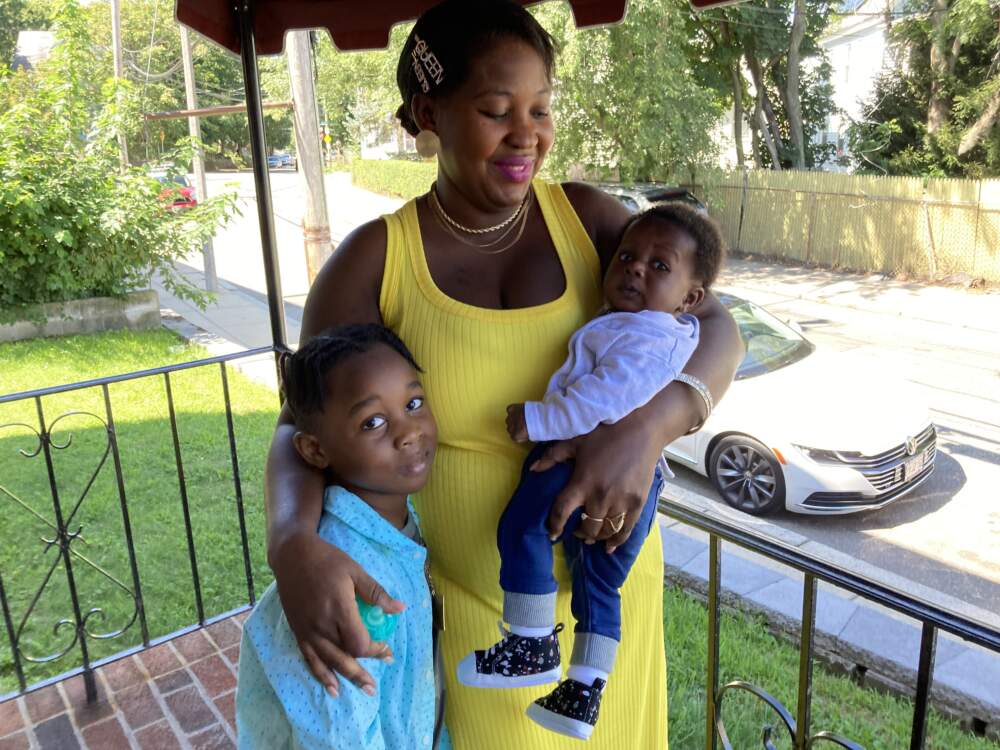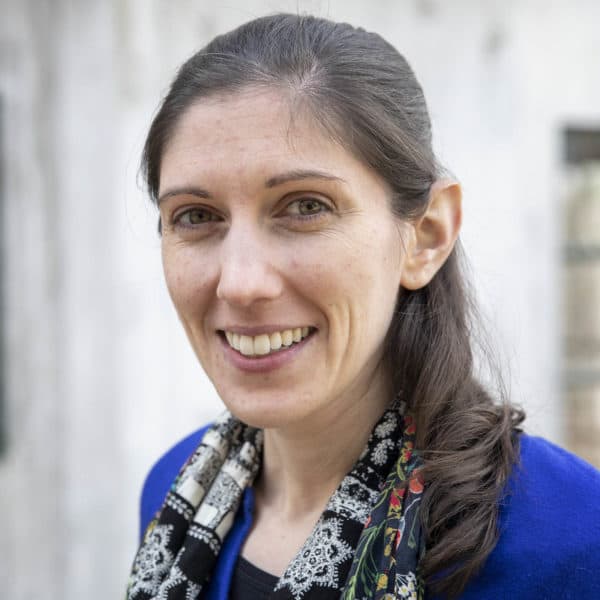Advertisement
As students return to classrooms, some newly arrived immigrants have to wait

The start of a new school year brings particular challenges for the more than 5,000 school-aged children in Massachusetts' rapidly expanding family shelter system. For some of those children who are newly arrived immigrants, there are additional barriers to overcome — and uncertainty about the first day of classes.
Five year-old Javier has spent his entire life on the road with his mother, fleeing unrest and a tough economic situation in Haiti. In early May, after traveling through three countries and two U.S. states, they arrived in Boston.
Cherlie Ocean, Javier’s mother, said there were terrible moments on their journey — like when Javier got stuck under a border fence. Watching her son get ready for kindergarten in the Boston Public Schools, she said, makes things a lot better.
And Javier is excited too.
“He can't even sleep. He's been like, ‘Mom, when am I gonna go to school? I cannot wait to go to school,'” Ocean said, speaking through a Haitian Creole translator.
Ocean and her son are among tens of thousands of Haitians who have traveled to the United States in recent years with dreams of a better life and an education for their children. Some of these families have made their way to Massachusetts, landing in increasing numbers in the state-funded family shelter system.
But starting school is a separate, and sometimes complex, step. The effort to verify and complete the children's vaccination records, enroll them in school and equip schools with translators and transportation plans, has proved daunting. And, even as the first day of school arrives, it remains a work in progress. The result is that some children will not begin the school year on time.
Vaccinating kids: 'A huge challenge'
For many families, getting basic childhood vaccinations against ailments like measles and mumps is “a huge challenge,” said Geralde Gabeau, the executive director of the Immigrant Family Services Institute, or IFSI, a social service agency that largely serves the Haitian community.
“Unfortunately, a number of our children will probably have a delay in terms of getting to school because of [vaccination issues],” Gabeau said. “We believe that for most there will be a delay.”
Some families have managed to book vaccination appointments, but they are two to three months away, Gabeau said.
Under federal law and guidance from the state, schools can enroll children who are homeless even without vaccination records. However, advocates report vaccination status has been an obstacle for some students.
Just two weeks before the first day of class for many school districts, the state organized a mobile vaccination program for children in shelters, explained Dawn Fukuda, assistant commissioner and director of the Bureau of Infectious Disease and Laboratory Sciences at the Massachusetts Department of Public Health. But no shots have gone into arms yet; clinic staff has been preparing to deliver them.
Advertisement
“They needed time to order those vaccines. We needed time to make sure they could properly store and handle them,” Fukuda said.
“When people don't have stable homes, schools become the children's stable home.”
Danielle Ferrier
The first vaccines are expected to reach shelter residents this week, and continue daily through September.
Fukuda said officials are discovering that many kids already had the usual slate of childhood vaccinations, but those records were not yet in the state system.
In some places, local boards of health have been able to vaccinate kids who lacked immunizations. When officials in Concord realized that children staying at a hotel-turned-shelter needed vaccinations to enroll in the town's summer camp, they mobilized.
“Right now in Concord, we don't have a public health nurse,” said Melanie Dineen, the director of public health in Concord. So Dineen reached out to a public health nurse in Malden — someone she had met during the COVID vaccination effort. “I literally called her on her cell phone and was like, ‘Maria, I have a really big favor to ask. Do you have vaccines?’”
Concord ended up busing children to Malden, so they could be immunized and start camp.
But statewide, there is still a lot of vaccination work to be done, and the Department of Public Health's shelter program is just ramping up. “It's not where it needs to be,” Gabeau said.
Enrolling new students
Navigating the school enrollment process is another big challenge for many newly arrived families.
The state’s family shelter system has nearly doubled its caseload over the past year and is supporting more than 6,200 families. Gabeau is particularly concerned about the roughly 800 families in overflow hotel placements, without the usual shelter staff. They’ve had little or no access to caseworkers and translators.
“We cannot wait for all of the bureaucracy to be put in place for us to really be there to support those families,” Gabeau said. She’s hoping religious groups, school districts and the 250 newly activated National Guard members can help fill the gap, and connect families with school administrators.
But school enrollment can be further complicated because families don’t know how long they’ll stay in one shelter location. “Parents are like, ‘Okay, I would rather wait and enroll my child where I know that this is where I'm going to live,’ ” Gabeau said.
Advocates worry about this approach.
“They should not wait,” said Elizabeth Alfred, an attorney at Greater Boston Legal Services who focuses on the shelter system. “Being in a hotel is not indicative that it will be a short stay."
The state Department of Elementary and Secondary Education said it is working to help more families enroll. "We continue to work with other state agencies and with school districts to facilitate [enrollment], and in some cases, school districts are sending staff to hotels to help families with enrollment questions," the agency told WBUR in a written statement. The department said it has made a flyer available to districts.
'Trying to adjust'
Even when families succeed at enrolling children in school, their classrooms may not be ready for them. Some school districts have received little or no warning about families placed in their communities, and their schools often lack staff who speak Haitian Creole, the primary language for many of the newly arrived schoolchildren.
“We’re much better equipped as a district to communicate in Spanish," said Steve Zrike, the superintendent of schools in Salem. "So now, we're trying to adjust.”
Midway through the last school year, an empty dorm at Salem State University was temporarily converted into a family shelter. The district’s translation and interpretation team scrambled to respond. Luckily, Zrike said, many of the children picked up some Spanish during their journeys to the U.S. which eased communication.
“The students resilience is just amazing,” he said. But some logistics proved difficult — and expensive, including busing and transportation for the new students.
Zrike has watched as more families entered the state-funded shelter systems over the summer. “I do these community walks in Salem — myself and our family engagement lead — and almost every other family we encountered were unhoused students,” he said.
He expects the 80-plus cities and towns with shelter placements will navigate more bumps this school year.
One hurdle many advocates foresee is how schools will pivot to meet the educational needs of newly arrived students.
“We have children who haven't been in formal schooling before,” said Danielle Ferrier, who runs Heading Home, which contracts with the state to provide more than 350 family shelter units. “That is going to be a huge thing for the public schools to manage.”
Gabeau, with IFSI, has been working to help schools prepare for the newly arrived students.
“If you're going to place them in a first grade class with other students who already know their ABCs, who already know how to read, so those children are going to suffer,” Gabeau said. “Those are the things that we are really bringing the school district together to be thinking about.”
She and other advocates hope schools get it right because they can play a critical role.
“When people don't have stable homes," Ferrier said, "schools become the children's stable home.”
Editor's note: This post has been updated to reflect a change in statement from the Massachusetts Department of Public Health about federal law and school districts enrolling unhoused students.
This article was originally published on September 05, 2023.
This segment aired on September 5, 2023.
